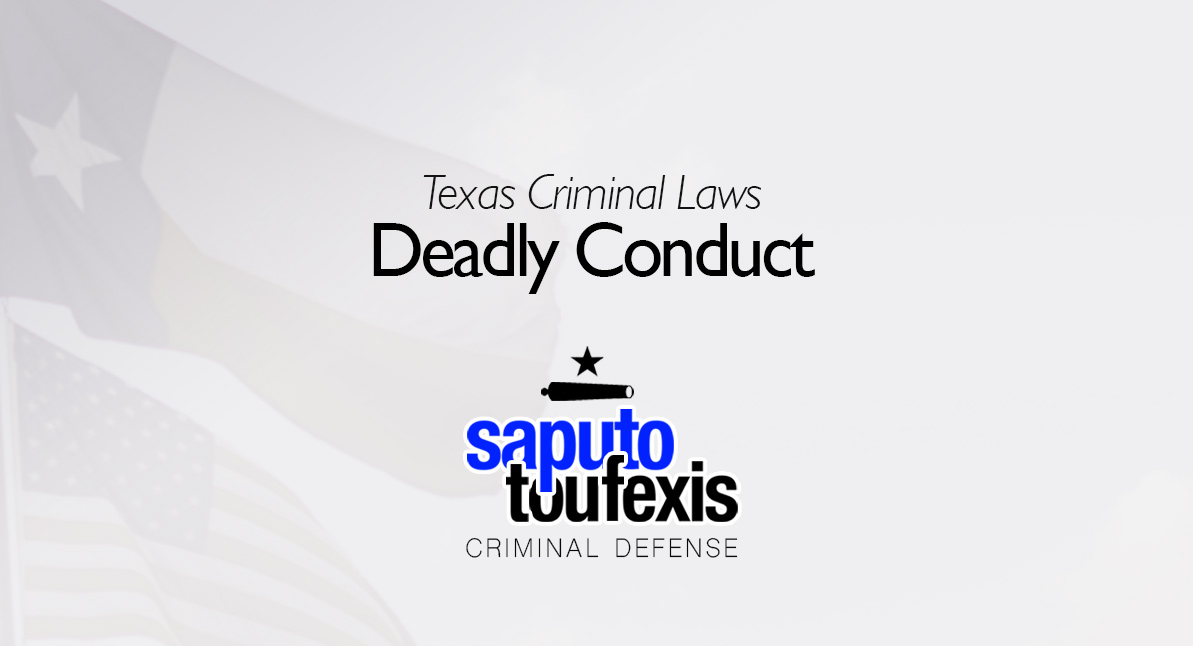The Texas Deadly Conduct law gives police the right to arrest you if they believe you discharged a firearm in the direction of a (1) person or even (2) at a vehicle or building if they think you were reckless about whether people could be inside the vehicle or building.
FAQs about the
Deadly Conduct law in Texas
- What is the current Texas law about Deadly Conduct?
- What is the penalty for a Texas Deadly Conduct offense?
- How to beat a Deadly Conduct charge in Texas?
- How can I be charged with a Deadly Conduct offense in Texas?
- What is the statute of limitations for Deadly Conduct in Texas?
- Can you get probation for Deadly Conduct in Texas?
- What level of crime is Deadly Conduct in Texas?
This crime is most often prosecuted when the state believes you recklessly discharged a firearm, but the state may also prosecute you for Deadly Conduct if they believe you recklessly put others in imminent danger of serious bodily injury even if no firearm was involved. See the section below for the most current law.
Have you been charged with Deadly Conduct? Contact us today to discuss legal representation.
or Text or Call (888) 239-9305
The law classifies this offense as either a misdemeanor or felony, depending on the circumstances alleged by the state.
The Texas legislature codified this criminal offense in Texas Penal Code Section 22.05. The law was most recently updated in 2025, when the legislature passed an amendment to the law providing that it there was no presumption of recklessness for police officers who point firearms at other people. Prior to this 2025 amendment, this law has not been amended since 1993.
The Penal Code classifies the Texas Deadly Conduct law under Title 5 “Offenses Against The Person,” Chapter 22 “Assaultive Offenses.” Learn more about the Texas offense of Deadly Conduct below.
What is the current Texas law about Deadly Conduct?
There are two ways to violate this law, one is described in subsection (a), and the other in subsection (b):[1]
(a) A person commits an offense if he recklessly engages in conduct that places another in imminent danger of serious bodily injury.
(b) A person commits an offense if he knowingly discharges a firearm at or in the direction of:
(1) one or more individuals; or
(2) a habitation, building, or vehicle and is reckless as to whether the habitation, building, or vehicle is occupied.
Under the law, recklessness and danger are generally presumed if the you knowingly pointed a firearm at or in the direction of another whether or not the actor believed the firearm to be loaded.[2] However, in 2025, the legislature provided an exception to this presumption for peace officers.[3]
In 2025, the legislature also passed an exception to the law for peace officers: “(b)(1) does not apply to a peace officer if, at the time of the offense, the officer: (1) was engaged in the actual discharge of the officer’s official duties; and (2) reasonably believed the discharge of the officer’s firearm was justified under Chapter 9.”[4]
What is the penalty for a Texas Deadly Conduct offense?
An offense under subsection (a) – the “imminent danger of serious bodily injury” offense – is classified as a Class A misdemeanor,[5] with a maximum possible fine under Texas state law of up to $4,000 and jail time of up to one year.
The law classifies offenses under subsection (b) – the discharge toward individuals, habitations, or vehicles offense – as felonies of the third degree,[6] with a maximum possible fine under Texas state law of up to $10,000 and prison time of up to 20 years.
How to beat a Deadly Conduct charge in Texas?
A Deadly Conduct conviction (or even a deferred adjudication plea) can send you to jail or prison, cost you thousands of dollars in fines and fees, and possibly affect your gun rights. The best way to beat this charge is to fight back by attacking the facts that the state alleges and to challenge them every step of the way. We highly recommend that you hire the best attorney that you can. If you have been accused of this charge, please make sure to book a consultation to discuss your options.
How can I be charged with a Deadly Conduct offense in Texas?
You can be charged with Deadly Conduct if the state’s attorneys believe that each of the elements of §22.05(a) or 22.05(b), as described in the section above, have been met according to the accusation or complaint.
What is the statute of limitations for Deadly Conduct in Texas?
Misdemeanor level Deadly Conduct charges have a two-year limitations period.[7] Felony level offenses follow the default felony limitations period rule, which specifies a three-year limitations period.[8]
Can you get probation for Deadly Conduct in Texas?
Yes, a judge or a jury may grant you probation or deferred adjudication community supervision if you are convicted of or plead guilty to Deadly Conduct.
What level of crime is Deadly Conduct in Texas?
The Penal Code classifies the punishment for Deadly Conduct offense under subsection (a) as a Class A misdemeanor, and an offense under subsection (b) as a felony of the third degree.
Learn more about the penalty range for this offense in the section above.
Legal References:
^1. Texas Penal Code §22.05. This law is current as of 2025.^2. Texas Penal Code §22.05(c)^3. Texas Penal Code §22.05(c), as amended by SB 1637, 89th Legislature (RS), Section 1^4. Texas Penal Code §22.05(f), added by SB 1637, 89th Legislature (RS), Section 1^5. Texas Penal Code §22.05(e)^6. Texas Penal Code §22.05(e)^7. Code of Criminal Procedure 12.02(a)^8. See Code of Criminal Procedure 12.01(11)










